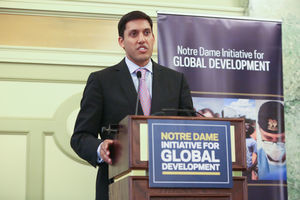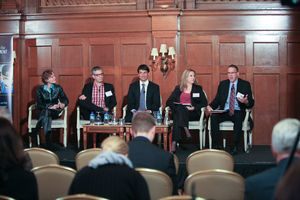On October 30th, 2014, the University of Notre Dame Initiative for Global Development (NDIGD) welcomed key government stakeholders and corporate representatives to Washington, D.C. for the Global Impact Forum. The Forum included both roundtable and panel discussions focused on best practices for public-private partnerships, as well as a keynote address delivered by USAID Administrator Dr. Rajiv Shah.
The Global Impact Forum addressed a growing trend in global development over the past several decades in which the private

sector is providing an increasingly higher percentage of funding for developing countries. Because of this, the need for government leaders to engage with the private sector in promoting global development has become more apparent. In the past, federal agencies supplied the majority of funding for developing countries, and at one point accounted for about 70 percent of funding. That percentage has continued to decrease over time, and government funding now represents only 9 percent. With 91 percent of global development funding now provided by non-government funders, the private sector has become a major player in the global development effort, and it is becoming increasingly more important to find common objectives with the private sector that garner their investment.
NDIGD welcomed key stakeholders from both the public and private sectors to ensure a comprehensive and well-rounded dialogue throughout the Forum. Government leaders from USAID, U.S. Department of State, the Millennium Challenge Corporation, World Bank Group, and other agencies were in attendance. Corporate representatives attended the Forum from a wide spectrum of companies, including Accenture, IBM, HP, Deloitte, Cummins, Boeing, PricewaterhouseCoopers, Xerox, SAP, AECOM, Microsoft, Kimball Electronics, Caterpillar, and others. Universities and NGOs also participated in discussions to provide their recommendations on partnering with the private sector.
The conversation began with morning roundtable discussions during which several representatives from both the public and private sectors discussed the greatest challenges and motivations in engaging in public-private partnerships. Overall, the theme emerged that each side has tools to offer the other, and both sides of the discussion were able to walk away with a more comprehensive understanding of the objectives and challenges of their counterpart.
Afternoon panel discussions addressed common challenges faced by both the private and public sectors. Sessions included

“Leading Through Training: Accessing Access to Talent in the Developing World,” “Sparking Economic Growth in New Markets,” and “Decision Making in the Face of Global Shifts.” The Mandela Fellowship for Young African Leaders (YALI Program) was highlighted during the discussion of accessing talent in the developing world, with representatives from the Department of State, IBM, IREX, and Notre Dame’s Mendoza College of Business sharing their insights and perspectives on the benefit of the partnership. Similarly, Connectivity, Electricity, and Education for Entrepreneurship (The CE3 Project) was highlighted during the panel and focused on sparking economic growth. Representatives from Cummins, HP, and Accenture were able to give their firsthand accounts of the benefits of working together with the University of Notre Dame to achieve this goal.
In giving the keynote address, USAID Administrator, Dr. Rajiv Shah, highlighted USAID’s recent investment in partnership with both the private sector and universities through the U.S. Global Development Lab. Dr. Shah highlighted programs such as the USAID Research & Innovation Fellowship Program, the Higher Education Solutions Network, and the Washington Mandela Fellowship for Young African Leaders as opportunities for both the private sector, universities, and NGOs to partner together. Dr. Shah expressed the need to work with multi-sectorial, innovative partners to help address some of the most pressing global challenges such as Ebola, and highlighted mechanisms to do so like the Grand Challenge for Development to fight Ebola.
NDIGD’s Global Impact Forum enabled public and private stakeholders alike to examine the global impact that their partnerships can have, and established communication to help shape them in the future.
Contact: Joya Helmuth, NDIGD Outreach Associate, jhelmuth@nd.edu